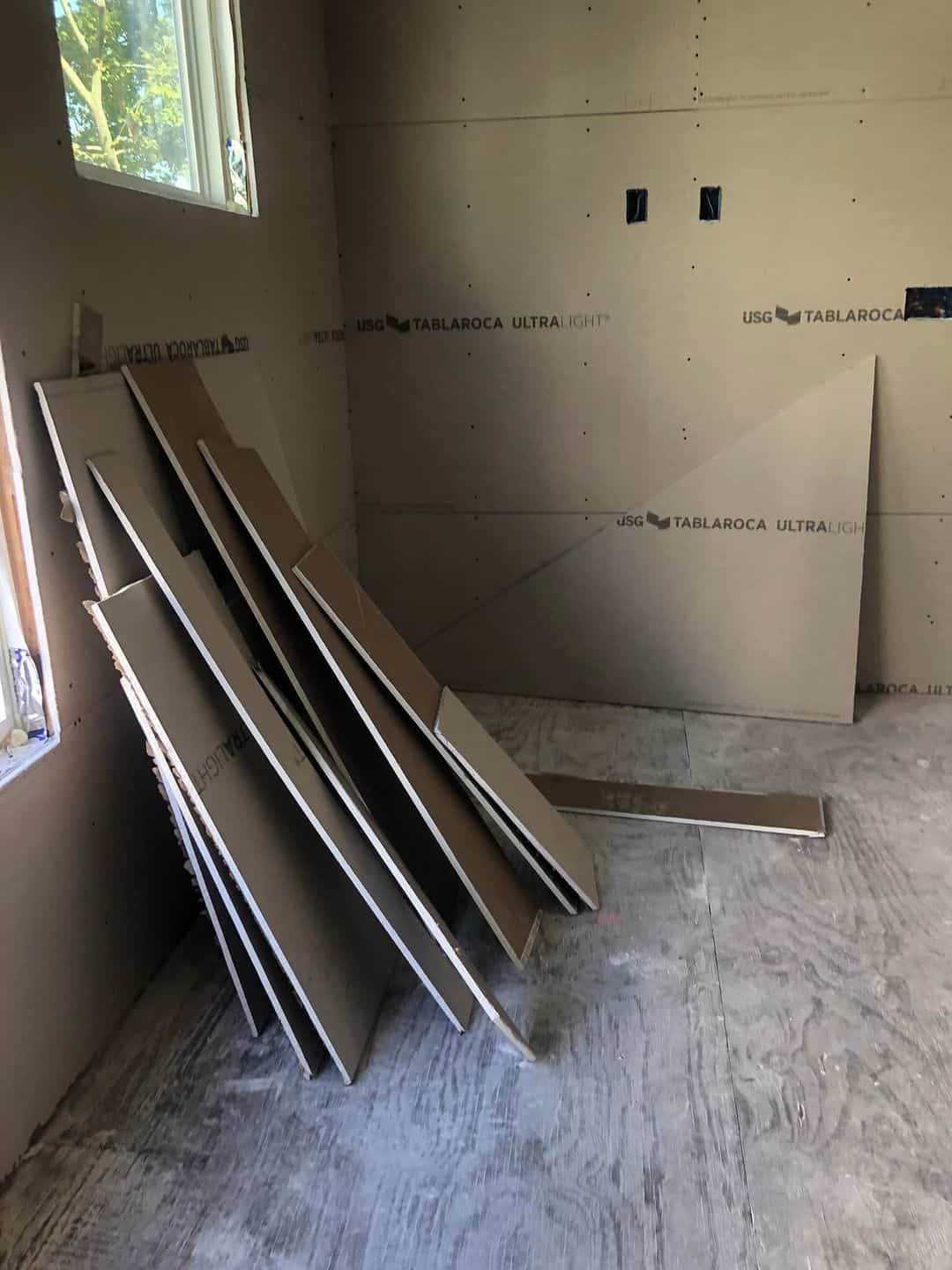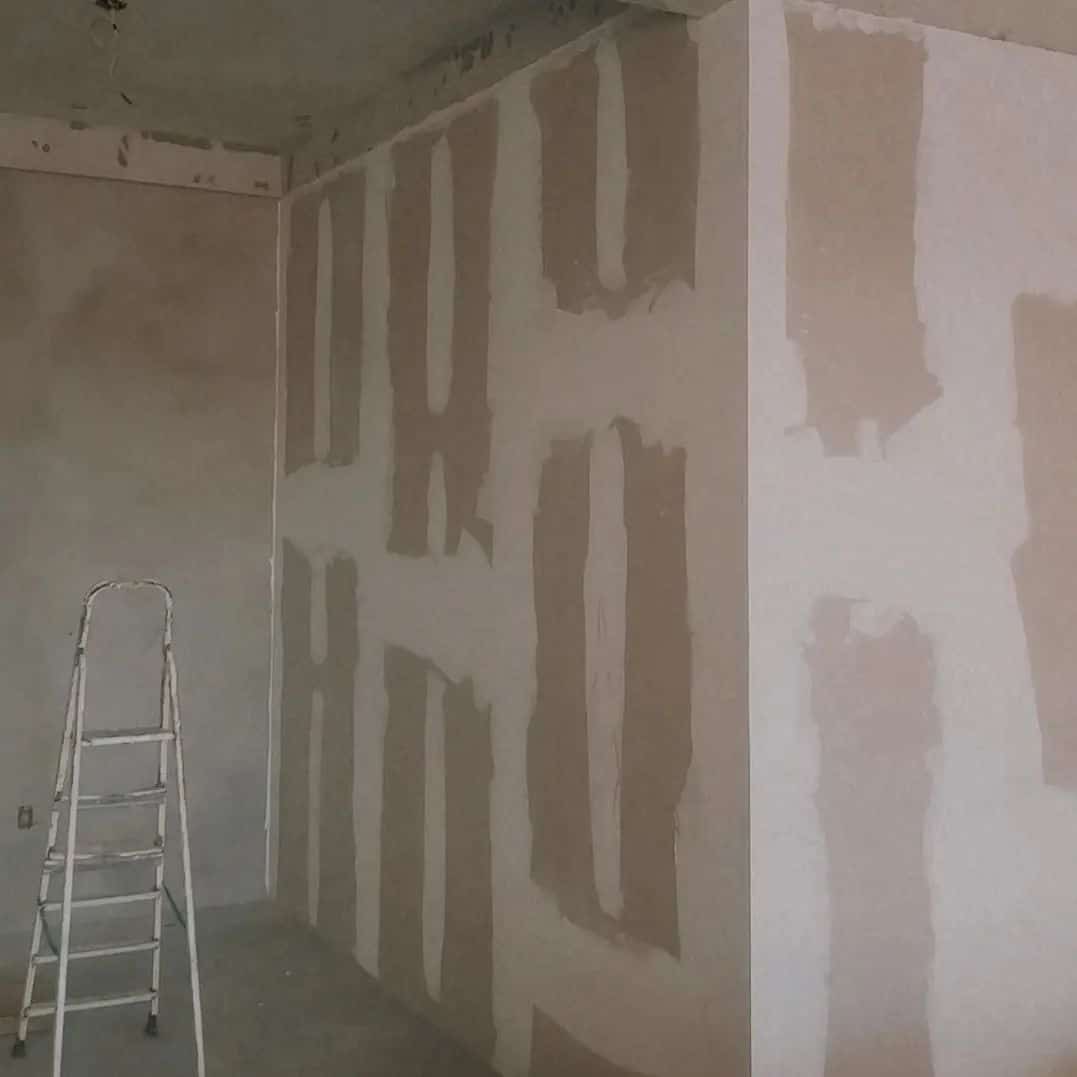Have you ever wondered how much drywall weighs? This is an important question to answer when it comes to remodeling and construction projects. Understanding the weight of drywall can help you plan for larger projects and allot the needed time, materials, and manpower to get it done quickly and safely.
Drywall is a common material used in interior wall construction, and it can range from lightweight to heavy-duty boards. Knowing the weight of drywall helps ensure that your walls are properly supported when the installation is complete.
This article enumerates the different types of drywall, how much each type weighs, their uses, and why they vary.
So let’s dive in!
What is Drywall?

Drywall is a popular material used in building and construction projects such as walls and ceilings. A drywall with a gypsum core plaster is the same as regular drywall. Still, lightweight drywall provides many advantages, like being light on your wallet due to its adhesive polymers and cost-effective raw materials.
Drywall can be cut and shaped to fit any space, making it an excellent choice for many projects. But one of the most important considerations when working with drywall is its weight. Knowing how much a sheet of drywall weighs can help you plan for the right equipment and personnel to safely transport and install the material.
Types of Drywalls
Different types of dry walls are:
- Standard drywall
- Mold-resistant drywall
- Lightweight drywall
- Moisture-resistant drywall
- Fire resistant drywall
- Greenboard
Weight of a Drywall Sheet
A sheet of drywall weighs approximately 54 lbs, but this can vary from as light as 38 lbs to as heavy as 90 lbs depending on factors such as size and type. Standard half-inch drywall panels come in 4 x 8, 4 x 10, and 4 x 12-foot sizes.
Similarly, thicker panels also weigh more than thinner ones. For example, a 4 x 8-foot board of 1/2″ drywall will weigh around 54 lbs, while the same size board with 5/8″ thickness will weigh approximately 68 lbs.
To make your life easier, an online calculator can calculate the approximate total drywall weight for any project. This will enable you to determine whether or not your truck has the capacity to transport it all safely and conveniently.
1. Ultralight Drywall Weight
Ultralight panel or lightweight drywall is a type of drywall that is lighter and easier to install as interior walls than traditional boards. The sheetrock ultralight drywall weight varies depending on the size, thickness, and type, but it generally has a lower weight than the standard gypsum wallboard.
For example, a 4 x 8-foot board of 1/2″ ultralight drywall may weigh as little as 32 lbs, while a 5/8″ version of this board typically weighs around 48 lbs.
Despite its lightweight, ultralight drywall still offers the same level of strength and durability as standard plasterboard or gypsum board. This makes it an ideal choice for projects where weight is a factor, such as ceilings or walls in multi-story buildings.
2. Fire-Safe Drywall Weight
The weight of fire-safe drywall is generally similar to that of ordinary gypsum wallboard. The exact weight will vary depending on size, thickness, and type, but it typically falls within the same range as traditional boards.
For example, a 4 x 8-foot board of 1/2″ fire-rated or fire-resistant drywall typically weighs between 52 and 58 lbs, while the same board with 5/8″ thickness will usually weigh between 68 and 74 lbs.
3. Soundproof Drywall Weight
Generally speaking, it will weigh the same or slightly more than traditional gypsum wallboard.
For instance, a 4 x 8-foot board of 1/2″ soundproof drywall typically weighs between 38 to 42 lbs.
Soundproof drywall is specially designed to block sound transmission to reduce noise levels. It typically consists of multiple layers with a core made of mineral wool, foam, or other sound-absorbing materials.
This extra material gives soundproof drywall a higher weight than traditional gypsum wallboard but is necessary for optimal soundproofing.
Factors that Impact the Weight of Drywall
1. Type of Drywall
Certain types of drywall, such as soundproof and fire-resistant varieties, may weigh more than traditional gypsum board. This is due to the extra material used for sound absorption or fire protection.
Drywall that has been pressure treated with certain compounds, such as mold-resistant paint, may weigh more than conventional drywall due to the additional material used in the treatment process.
2. Size of Drywall
The size of the sheet also plays a role in determining its weight. As the area of a sheet increases, so does its total weight. Large-size sheets will weigh more than smaller ones, but not always.
3. Density of the Core Material

The density of the core material used in drywall affects its overall weight. Higher-density materials, like ceramic fiberboard, will weigh more than lower-density materials, such as gypsum.
Thicker, denser boards are heavier than thinner ones. Like 2-Inch drywall weighs less than 8-inch drywall
4. Grade and Quality of Drywall
The grade and quality of the drywall can also impact its weight. Higher-grade boards usually have denser cores, making them heavier than lower-grade boards. Similarly, paper with a higher GSM (grams per square meter) rating will add to the weight of the sheet.
Higher-quality materials typically add to the weight of a sheet of drywall.
5. Environmental Conditions
Temperature and humidity levels can affect the board’s weight due to moisture content changes. The board takes in more moisture as the temperature rises and gains weight. Similarly, a decrease in temperature causes the board to lose moisture and become lighter.
Knowing the weight of drywall is important when planning and installing this material, as it affects how much support is needed. By taking into account the thickness, size, density, and quality of materials used, you can accurately calculate the total weight of your drywall.
Whether it’s for soundproofing or fire protection, having an understanding of the weight of drywall is key to a successful installation.
How to Calculate the Weight of Drywall
Need to know how much your drywall weighs? Just utilize the weight per square foot reference table (for imperial weights, such as lbs) for a fast and easy calculation.
To begin with, you’ll need to calculate the square footage of your desired sheet. For instance, a 4-foot by 8-foot sheet has an area of 32 sq. ft (determined by multiplying both dimensions).
To find out the weight per square foot of materials, such as a 1/2 inch standard drywall sheet, you can refer to the reference table above, which states that it is 2.4 lbs/ft².
Summing up the process, we must multiply the sheet area (32 square feet) by its weight per square foot (2.4 lbs/ft² in this case), effectively giving us a total sheet weight of approximately 76.8 lbs.
Instead, why not make your life easier with the Drywall Weight Calculator? Input a few details, and you’ll get an accurate reading in seconds – no hassle required!
Tips and Tricks for Working with Drywall
- Always wear protective equipment when handling drywall.
- Use the right tools for cutting drywall, such as a drywall saw or utility knife.
- Measure twice, and cut once to save time and materials.
- Sand down any rough edges after cutting.
- Wear a dust mask when sanding drywall to protect yourself from harmful particles.
- Secure the drywall with screws or nails, not glue.
- Use the appropriate joint compound for your project and apply it correctly.
By following these tips, you can make sure that your drywall is installed correctly and safely – no matter what kind you choose. With the right tools, information, and preparation, you can be confident that your project will be a success.
FAQ
1. What is the Total Weight of Drywall per Square Foot?
Depending on its type and thickness, drywall weight per square foot can vary drastically. Typically, a 4 x 8-foot sheet of 1/2″ gypsum wallboard (the most common type of drywall) will weigh about 38 lbs per square foot.
A sheet of 5/8″ drywall will weigh about 64 to 70 lbs per square foot.
Note that these weights are just estimates, as there can be slight variations from one batch of drywall to the next.
2. What are the Benefits of Ultralight Drywall?
In addition to its lighter weight, ultralight drywall has other benefits that make it an appealing option for many projects. It’s moisture and mold resistant, fireproof, and can be installed quickly and easily. These factors make ultralight drywall excellent for various construction projects.
Whether you’re planning to use traditional gypsum wallboard or ultralight drywall, you need to know the weight to ensure your project is successful and safely installed.
Final Thoughts
Drywall weight can vary depending on the board’s type, grade, size, and density. To calculate accurately, it’s important to consider all of these factors. With so many advantages drywall offers, it’s no wonder it is a popular choice for building and renovation projects.
Now that you know how to calculate and measure the weight of drywall, you can make an informed decision about which type and thickness you need for your project.
From soundproofing to fire resistance, many benefits make drywall a great option – not to mention it’s lightweight! So, if you’re looking for an easy-to-use material with all the desired features, then drywall is worth considering.
